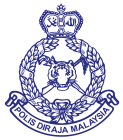Malaysian Special Branch
The Special Branch or SB is an intelligence agency attached to the Royal Malaysian Police.[1] The SB is empowered to acquire and develop intelligence on internal and external threats to the nation, subversive activities, extremist activities and activities of sabotage and spying. It is also empowered to analyse and advise on the necessary course of action to the various departments and agencies both within the Police Department and other related agencies. In the past, they have worked together in reforming the Thai Special Branch.[2]
The SB is the successor of the Malayan Security Service.[3]
Administration
The SB was initially modelled after the Special Branch of the United Kingdom.
Activities
Communist insurgency (1948–1989)
During the Malayan Emergency, when the Malayan Communist Party (MCP) guerrillas were in open revolt, the Special Branch successfully infiltrated the party chain of command. Reportedly, one Special Branch officer managed to gain sufficient trust from the MCP to be ordered to infiltrate the Special Branch. He in turn managed to feed false information back to the MCP. It has also been claimed that the second-most high-ranking official in the MCP was a Special Branch agent, who was executed when he was discovered.
The Special Branch's activities during the Emergency were widely praised, garnering accolades such as one calling it "one of the finest establishments of its kind in the world".[1] Other intelligence agencies sent observers to a Special Branch training centre in the Malayan capital of Kuala Lumpur to learn its tactics of infiltration and espionage.[1] It was during this period that the British "Asianized" the Special Branch, replacing its crop of British spies and officers with trained locals.[4]
Anwar Ibrahim scandal
In 1998, former Deputy Prime Minister Anwar Ibrahim was charged with sodomy and corruption, both crimes in Malaysia. During his trial, a number of statements were made by Special Branch officials, who had been implicated in the case.
One allegation made against Anwar was that he had ordered Special Branch officials to obtain retractions of the sodomy-related allegations against him. However, the Special Branch officials involved told the court that they had reason to believe the charges were fabricated by Anwar's political opponents. Two Special Branch men involved were its then Director, Mohamed Said bin Awang, and Second Deputy Director, Amir bin Junus. One witness at the trial testified that Mohamed Said had told Anwar to allow the Special Branch to look into the matter, instead of Anwar directing the Special Branch to cover it up.
During the trial, Mohamed Said shed light on the Special Branch's practices — mainly by explaining what was called a "turning-over operation", whereby retractions were obtained. At one point, he described it as a "great secret", and refused to elaborate beyond his explanation that "Basically we do a quick assessment on our target, then we see how the possibilities are to turn over their stand," and that "If it is a certain political stand, we may neutralize the stand if it is a security threat".[5] Mohamed Said later responded to the question "If someone higher than the deputy prime minister were to instruct you to come and lie to the court here, would you do it?" with "Depends on the situation." After being pressed for a clarification by the judge, he said, "I may or I may not".[6]
Present day
Raja Petra Kamarudin, a former detainee under the Internal Security Act (ISA), has claimed that when he was brought in for questioning, he was astonished by how well-informed they were about his activities: "It was astonishing that they had been able to take all those photographs of me without me realising it. It began to make me wonder whether they had any other photographs of me and my wife in my bedroom doing.....well, you know. ... It was as if they had been present in the meeting room, had participated in the meeting, and had tape-recorded the entire session. We might as well just admit our crime and sign the confession..." He also claimed that the Special Branch had successfully infiltrated the hierarchy of several political parties in the country.
See also
- Special Branch - Other Special Branch units in Britain and Commonwealth countries/territories
Notes and references
- 1 2 3 "Special Branch". Retrieved 11 July 2010.
- ↑ Comber, 257.
- ↑ Comber, page 3
- ↑ Ongkili, James P. (1985). Nation-building in Malaysia 1946–1974, p. 79. Oxford University Press. ISBN 0-19-582681-7.
- ↑ "Secret tactics used by Malaysian police, top cop tells Anwar trial". Archived from the original on 8 May 2001. Retrieved 11 July 2010.
- ↑ "Malaysia's intelligence chief tells Anwar trial he would lie". Archived from the original on 9 June 2001. Retrieved 11 July 2010.
Further reading
- Comber, Leon (2006). "Malaya's Secret Police 1945–60. The Role of the Special Branch in the Malayan Emergency". PhD dissertation, Monash University. Melbourne: ISEAS (Institute of SE Asian Affairs, Singapore) and MAI (Monash Asia Institute).
External links
| Wikimedia Commons has media related to Royal Malaysia Police. |
- T Shirt Special Branch
- Pro-democracy activist held in Malaysia during Myanmar president's visit
- Call for investigation into kidnapping of exiled Burmese journalist
- Abuse of Power Under the ISA
- Brutality in our own backyard
- Memorandum to SUHAKAM: Abuse of Section 18 of ISA in turning over detainees
- List of Royal Malaysian Police Force Address & Tel.
